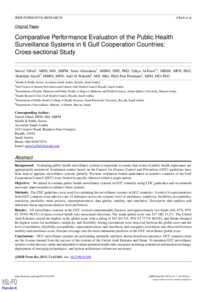Document
Comparative performance evaluation of the public health surveillance systems in 6 Gulf cooperation countries : cross-sectional study.
Identifier
DOI: 10.2196/41269
Source
JMIR Formative Research. v. 7, e41269
Contributors
Almudarra, Sami., Author
Al-Farsi, Yahya., Author
Al-Arifi, Abdullah., Author
Al-Wahaibi, Adil., Author
Penttinen, Pasi., Author
Country
United States.
City
Canada
Publisher
JMIR Publications Inc.
Gregorian
2023-04-01
Language
English
English abstract
Background: Evaluating public health surveillance systems is important to ensure that events of public health importance are appropriately monitored. Evaluation studies based on the Centers for Disease Control and Prevention (CDC) guidelines have been used to appraise surveillance systems globally. Previous evaluation studies undertaken in member countries of the Gulf Cooperation Council (GCC) were limited to specific illnesses within a single nation. Objective: We aimed to evaluate public health surveillance systems in GCC countries using CDC guidelines and recommend necessary improvements to enhance these systems. Methods: The CDC guidelines were used for evaluating the surveillance systems in GCC countries. A total of 6 representatives from GCC countries were asked to rate 43 indicators across the systems’ level of usefulness, simplicity, flexibility, acceptability, sensitivity, predictive value positive, representativeness, data quality, stability, and timeliness. Descriptive data analysis and univariate linear regression analysis were performed. Results: All surveillance systems in the GCC covered communicable diseases, and approximately two-thirds (4/6, 67%, 95% CI 29.9%-90.3%) of them covered health care–associated infections. The mean global score was 147 (SD 13.27). The United Arab Emirates scored the highest in the global score with a rating of 167 (83.5%, 95% CI 77.7%-88.0%), and Oman obtained the highest scores for usefulness, simplicity, and flexibility. Strong correlations were observed between the global score and the level of usefulness, flexibility, acceptability, representativeness, and timeliness, and a negative correlation was observed between stability and timeliness score. Disease coverage was the most substantial predictor of the GCC surveillance global score. Conclusions: GCC surveillance systems are performing optimally and have shown beneficial outcomes. GCC countries must use the lessons learned from the success of the systems of the United Arab Emirates and Oman. To maintain GCC surveillance systems so that they are viable and adaptable to future potential health risks, measures including centralized information exchange, deployment of emerging technologies, and system architecture reform are necessary.
ISSN
2561-326X
Resource URL
Category
Journal articles

